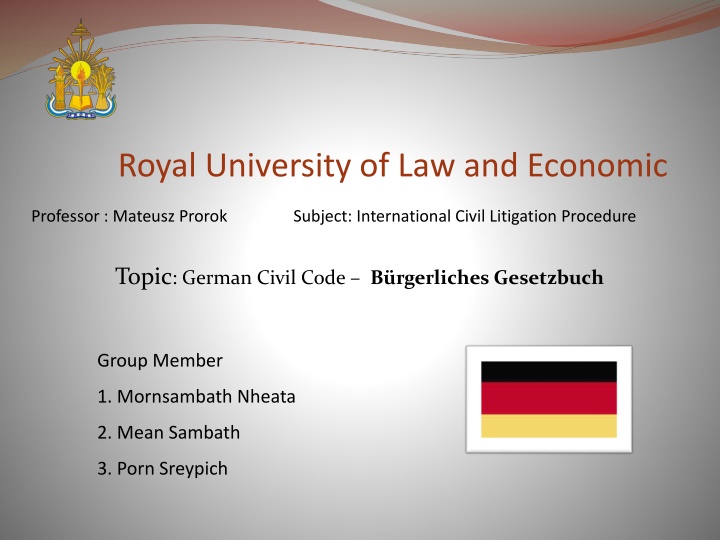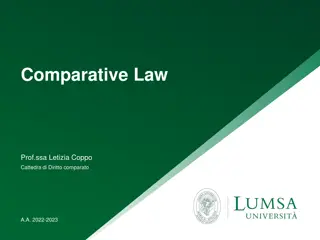
History and Structure of the German Civil Code (Bürgerliches Gesetzbuch)
Explore the origins and significance of the German Civil Code (Bürgerliches Gesetzbuch) in unifying private law in Germany. Learn about its development, coverage of legal areas, and impact on the nation's legal system since its inception in 1900.
Download Presentation

Please find below an Image/Link to download the presentation.
The content on the website is provided AS IS for your information and personal use only. It may not be sold, licensed, or shared on other websites without obtaining consent from the author. If you encounter any issues during the download, it is possible that the publisher has removed the file from their server.
You are allowed to download the files provided on this website for personal or commercial use, subject to the condition that they are used lawfully. All files are the property of their respective owners.
The content on the website is provided AS IS for your information and personal use only. It may not be sold, licensed, or shared on other websites without obtaining consent from the author.
E N D
Presentation Transcript
Royal University of Law and Economic Professor : Mateusz Prorok Subject: International Civil Litigation Procedure Topic: German Civil Code B rgerliches Gesetzbuch Group Member 1. Mornsambath Nheata 2. Mean Sambath 3. Porn Sreypich
Table Content : History of The German Civil Code - B rgerliches Gesetzbuch (or BGB) German Civil Code and The Development of Private Law Structure References
The German Civil Code (Brgerliches Gesetzbuch, BGB), was first drafted in 1881, ratified in 1896, and formally took effect on January 1, 1900. The process, spanning nearly two decades, established national Private Law in Germany, thereby unifying the formerly disjointed, inconsistent, and regional systems of private and family laws in Germany after the unification and the founding of the German Empire in 1871.
The Brgerliches Gesetzbuch covered contracts, quasi-contracts, civil liability, property, family law and estates but excluding parts of the law which the Germans preferred to codify separately in a Commercial Code (Handelsgesetz buch or HGB).
German Civil Code and the Development of Private Law The B rgerliches Gesetzbuch abbreviated BGB, is the civil code of Germany. It is the body of codified private law that went into effect in the German empire in 1900. The code grew out of a desire for a truly national law that would override the often conflicting customs and codes of the various German territories.
In the first half of the nineteenth century, the various states joined in the Deutscher Bund (German Federation) had already started to accommodate the needs of an expanding economy. The advent of machinery and urbanisation facilitated the production processes and the rising bourgeoisie favoured open markets promoting the free interplay of economic forces. With the Modernization of the Law of Obligations Act, most of the special statutes in the field of consumer contract law have now found a place in the BGB.
Structure of the German civil code The German Civil Code in divided into five parts: A General Part (Allgemeiner Teil) that comprises 240 sections. It acts as an introduction to the other four parts and contains general rules about individuals, their ability on concluding contracts, types of contracts, the annulment of contracts, and restrictions of actions. The Law of Obligations ("Recht der Schuldverh ltnisse") comprises 612 sections and describes the types of contracts and the obligations people have once they ve concluded a contract.
The Property Law ("Sachenrecht") contains 442 parts and is the legal frame for property possession, rights regarding property possession in Germany and the transference of such rights. The Family Law ("Familienrecht") comprises 624 parts and sets the provisions regarding marriage and family relations. The Succession Law ("Erbrecht") is the legal frame that enables the succession of goods that belonged to deceased persons and includes the German Law of Wills.
On the day the BGB came into force, one German publication ran this headline: One people. One empire. One law.
References https://www.lawyersgermany.com/civil-law-in- germany https://www.britannica.com/topic/German-Civil- Code German Civil Code (1896). GHDI Documents, at: http://ghdi.ghi- dc.org/sub_image.cfm?image_id=1694 (Accessed April 19, 2018).
End of Presentation Thank you for paying attention!!!

![❤[PDF]⚡ Civil War Talks: Further Reminiscences of George S. Bernard and His Fel](/thumb/20551/pdf-civil-war-talks-further-reminiscences-of-george-s-bernard-and-his-fel.jpg)




















